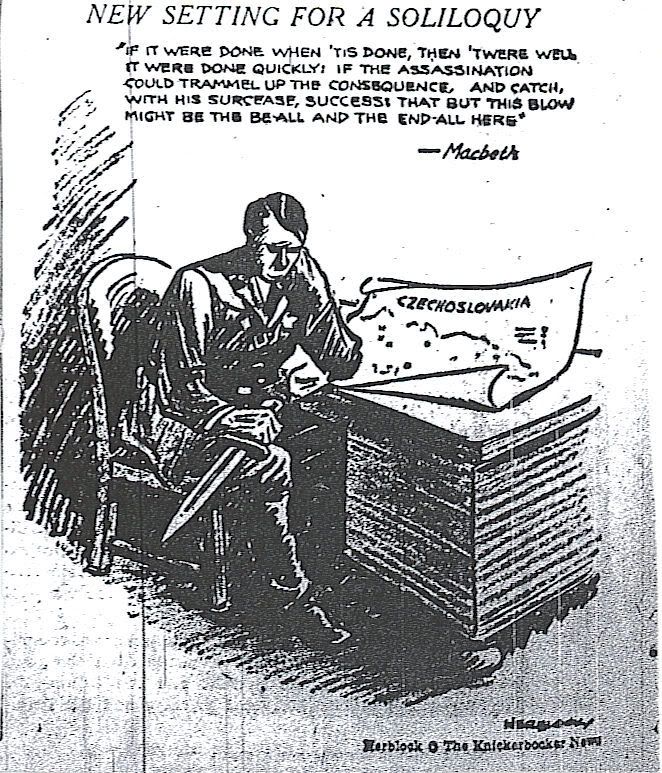
Posted on 09/04/2008 5:47:56 AM PDT by Homer_J_Simpson

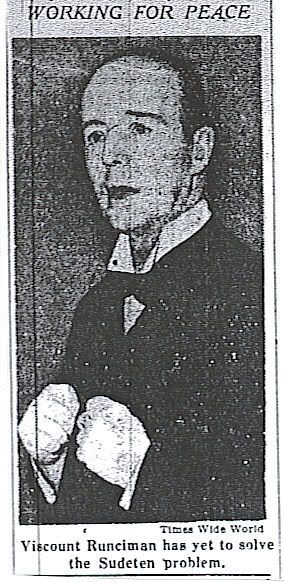
The menaces were skillfully built to the peak. The great army – estimates of whose numbers run from 1,000,000 to 2,000,000 – was being speedily assembled and was to be in readiness for action as the Nuremberg congress met this week. The Sudeten leaders told their followers to “defend” themselves by force; thus preparing the way for civil strife in Czechoslovakia that would give Hitler an excuse to move the army into that country to “protect” his wards.
The German press did its share. With all the violence of language Dr. Joseph Goebbels is capable of inspiring it laid the foundation for an invasion, painting a picture of an oppressed German population under assault from Marxist and Communist elements and longing to be relieved by being taken into the Nazi fold.
The final effect was produced by the spectacular visit of Hitler to the new Rhineland fortifications, conveying to both Britain and France broad intimation that, even if they chose, they could do nothing to save Czechoslovakia and could only involve themselves in a costly struggle for “vengeance.”
Britain Remains Firm
This campaign was widely interpreted as designed to get for Germany what she wanted without war by shaking the opposition so that she could be assured there would be no united front against her. If Britain could have been thrown into an attitude of fear and caution, in which she would feel she must force the Czechs to come to Germany’s terms and, additionally, compel France to remain aloof, then the objective might have been achieved.
One eminent Nazi, according to a credible story from Prague, thought the effort had succeeded. Field Marshal Goering was represented as boasting that Britain would “not raise a finger” to save the Czechs if Germany moved.
The results, however, have been quite contrary to any such expectations. Britain, instead of showing a spirit of avoidance, has shown firmness. She has not yet said she would fight for Czechoslovakia but her actions in the last week have carried very definite implications.
All her diplomatic force was put behind the Runciman commission, theretofore treated as unofficial. The Sudeten leaders were soundly rebuked for their threatening attitude and were plainly told they were expected to show a more accommodating spirit. “Without bluster or threat” Hitler was informed of the risks he would run if he started hostilities. And in Warsaw, Rome and other capitals British pressure was exerted to see that he should have not support in adventuring.
Steadiness of Peoples
Meanwhile steadiness was shown by the British, French and Czechoslovak peoples and statesmen. The London Cabinet was united in upholding what Prime Minister Chamberlain had done and proposed to do. The press and public showed similar unity.
In France there were differences over domestic questions. The labor unions set out to make trouble for Premier Daladier because he was virtually suspending the forty-hour-week law. But the parties of the Left have refused to break with the leader on this issue and to wreck the Cabinet in the critical hour. And the government, backed by the people and press, has presented a firm front to Germany. It has stood resolutely by its warning that, if Czechoslovakia should be invaded, France would go to war with the invader.
The Czechs themselves have shown no sign of panic. If there is to be war, they have let it plainly be known, they will fight as long as they can and depend on their friends to save them in the end.
Effect Upon Others
All this has had its effect on other peoples. Poland has indicated she will not take Germany’s side, and will not join in any partition of Czechoslovakia. Italy has advocated a peaceful settlement.
The German attitude at the end of the week showed recognition in Germany – and among the Sudeten Germans – that the campaign of moral terrorism had failed. The uncompromising Henlein suddenly listened to talk of compromise – and kept his revolutionaries in check. Hitler became ready to receive a friendly message from Lord Runciman and to permit negotiations to go on. He was reported to have expressed a hope of settlement by “the end of the year” – which would be after the great manoeuvres. Assurances were given to the British Ambassador by the Foreign Office that there was to be no “precipitate action.”
That, however, did not mean the crisis was over. It only meant that Hitler was hesitant in the face of hard facts. He was still pressing for a early decision at Prague and was still in position to force a deadlock and then to set his army in motion to “rescue” the Sudetens.
The question remained: Were Field Marshal Goering and Dr. Goebbels and Rudolf Hess, the deputy Nazi party leader, and Heinrich Himmler, chief of the nation’s police and of the Hitler Elite Guard – the champions of the policy of adventure – convinced it was really unsafe to go ahead? If not, could they yet persuade Hitler to strike before time ran too far against him and his regime?
Or: Would the army – which Paris heard was opposed to action – and its moderate supporters be able to persuade Hitler that he must at least wait until the armed forces were better prepared? The former army command opposed the invasion of Austria, representing it as highly dangerous, and was proved to be wrong. Would the present command be under the cloud of that reversed judgment?
Way Out for Hitler
One favorable feature of the situation is that the opposing powers have left the way open for a graceful exit by Hitler if he should wish to choose the way of moderation and postponement of the issue. They have handled the situation much more deftly than they did last May.
In that critical time Czechoslovakia mobilized, France gave notice that she was ready to issue the order for mobilization and the British Ambassador, at the height of the incident, ordered a train to be ready to take the Britons out of Berlin, indicating his country was ready to go to war.
This time, however, the Czechs have refrained from any emphasis on military readiness. France has put this year’s class into the army and kept the retiring class temporarily but there is not threatening or boasting. Britain is about to mobilize her fleet around Scotland but no emphasis is put on the movement.
Any warnings to Hitler have been kept as quiet as possible. Instead the emphasis is laid on the appeal to his better nature, to his desire for peace. If he should decide to strike that note at the Nuremberg conference it is not too much to expect that the British, perhaps even the French, would hail his loftiness of feeling and not suggest that he had again backed down in the face of force.
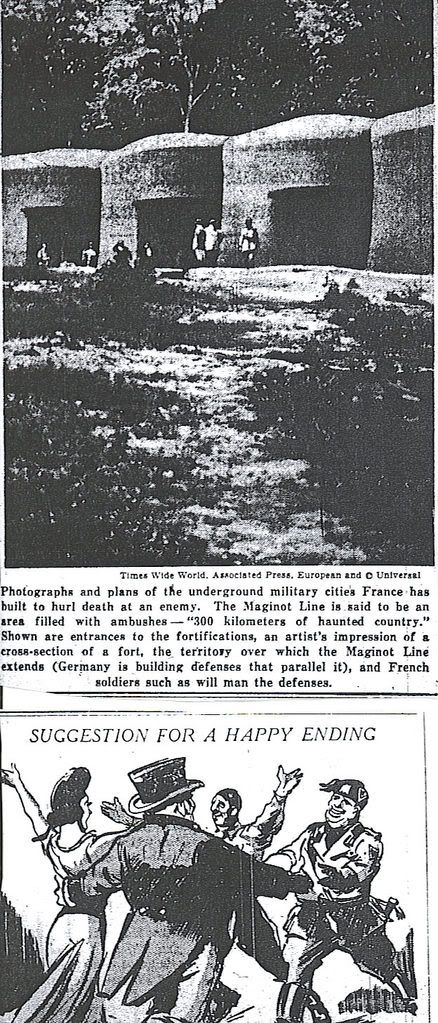
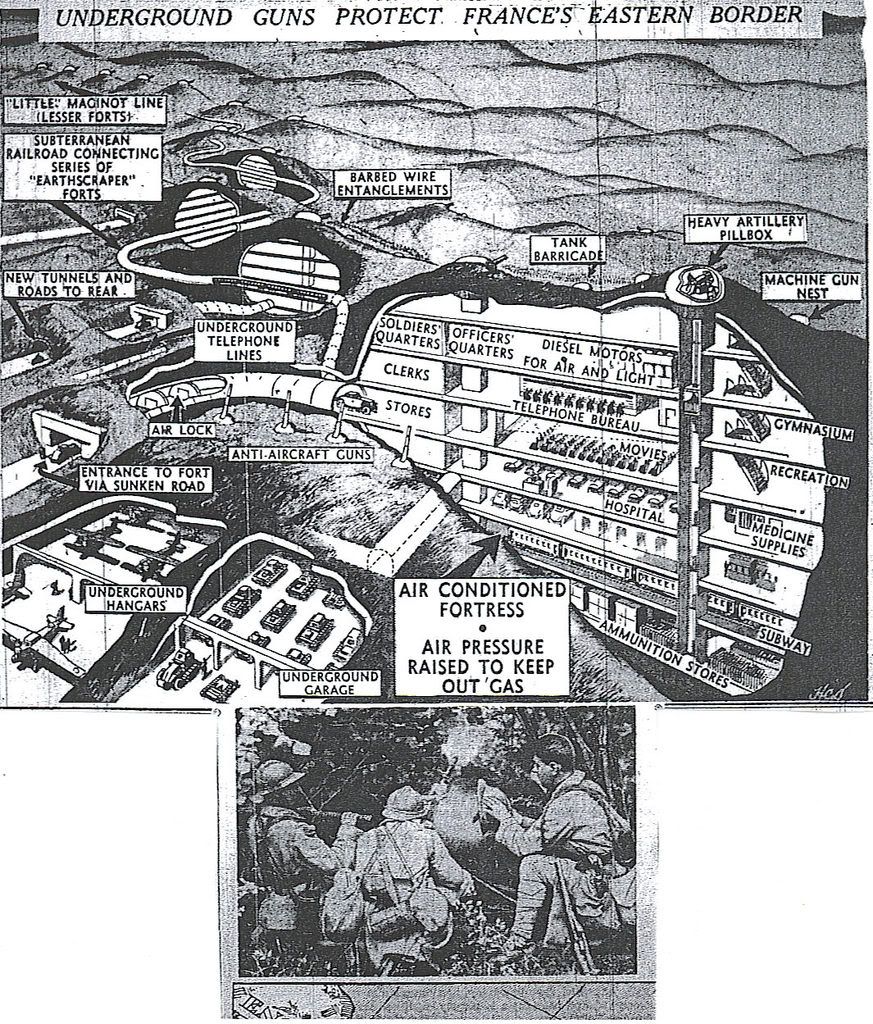
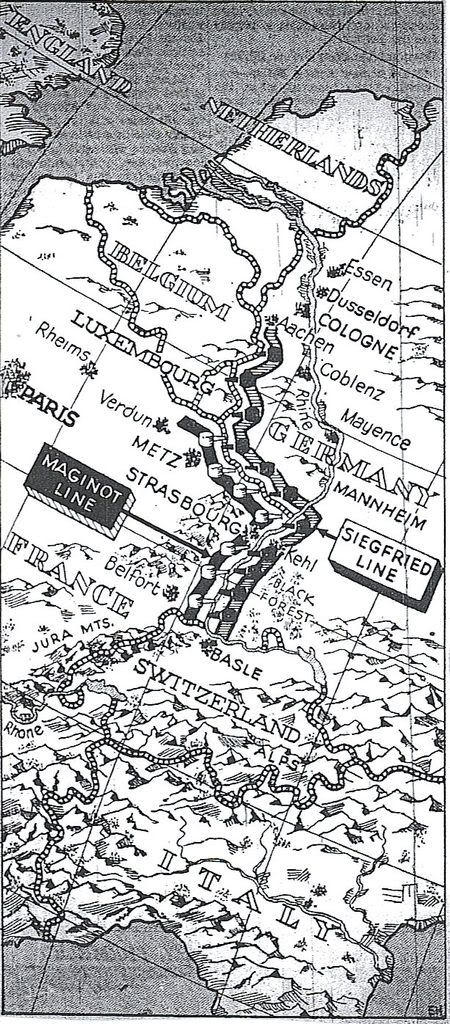
The lesson has nevertheless borne fruit. Today the whole French doctrine is expressed in terms of firepower, and for the defense of their frontiers the French no longer put their trust in human bodies, but in concrete and fire.
The Maginot Line, defending France’s eastern frontiers, is the pre-eminent combination of passive obstacle and active defense. This French fortification hardly rises above the ground. The soldiers who christened it “the crust of the East” found the fitting expressive image. The building of the “crust of the East” will one day come to be regarded as one of the great labors of this century.
A Story in Figures
According to figures given this writer by engineer officers who superintended the work, 12,000,000 cubic meters of earth were dug out on the Maginot Line between 1929 and 1936; 1,500,000 cubic meters of concrete were cast; 50,000 tons of steel plates were set in position; galleries were hollowed out which in a straight line would cover the distance from Paris to Liege; 15,000 workmen were engaged on the construction; seven billions of francs were spent. Today new works have been begun to extend the “crust” facing the Jura and to fortify the north. On the “crust” itself, as I was able to see, work never ceases; its defense is incessantly reinforced.
Great precautions are taken by the builders to assure the maximum of resistance for this “crust.” The towers of the underground workings, which weigh some 120 tons, are monolithic, and no shell can penetrate their concrete walls.
Protection of Forts
Defense against gas is assured by a special process; electric machinery maintains in the interior an atmospheric pressure slightly higher than the exterior pressure. In order to prevent all communication with the gas-poisoned outer air, and also in order to do away with all loopholes, the guns in the three turrets pivot on a ball mounted in the armor plate.
The gunners lay their guns as sailors do in the turret of a warship without seeing anything, simply by following the indications on a dial controlled by an artillery officer, who is in a hermetically sealed armored chamber. The artillery officers see the outside world through panoramic telescopes built into the armor plate. The men are protected by cuspated embrasures, so that a shell hitting the concrete could not glance off the casing and wound the defenders.
Deep-Laid Phone Lines
The telephone lines, of primary importance for the transmission of orders and information, are buried five meters deep in concrete slabs. For each line there are at least two alternative lines on different circuits. The subterranean network ends in telephone exchanges installed fifty meters deep.
Thus protected, the soldiers of the “crust” can resist the fiercest bombardments. But that is not enough; in war it is necessary to strike – that is to say, there must be active defense.
The active role is played by the armament which the concrete protects.
Behind their cuspated embrasures the men of the Maginot Line can cover the frontier zone with a sheet of fire. Woe to the man who sets foot in this steel caldron! Each casement is a volcano ready to spit flames in front, behind and on all sides as close as well as at long range.
All this zone of invisible death is further protected by look-out posts, alarm-signals, periscopes, sound-locating posts, barrages of infrared rays. All over the region there are spying eyes, listening ears and weapons ready by day and night. The whole countryside is packed with ambushes; one does not know where to set one’s foot. It is like 300 kilometers of haunted country.
Likened to Battle Fleet
The Maginot Line can be thought of as a fleet moored in the chains of hills that lie parallel to the frontier. This fleet has flotilla craft to scout for it; they are blockhouses garrisoned by a dozen men whose duty it is to delay the assailant for three days so as to enable the higher command to gauge the principal point of attack. As cruisers, it has a line of artillery in revolving gun-turrets. Its capital ships are underground fortresses.
When the scouting forces have played their part they fall back, as on the sea, to the main body, by a system of underground labyrinths which has made the frontier region, to a depth of fifty kilometers, look as though it were covered with mole-hills.
The strength of the “crust of the East” lies in the diversity of its works; the variety of dimensions and of camouflage keeps the visitor in a state of complete astonishment. Between Metz and Besancon I visited more than thirty casemates and did not find two of them the same. Some were sunk in the earth, others crouched under railway embankments, others hung on the sides of precipices. I even found a casemate emerging from a swamp.
So much for the small links in the chain. But there are still the big forts, whose power of resistance is thrillingly impressive. They are nothing less than buried barracks with kilometers of passages lit by electricity and provided with metaled tracks; they have hot water laid on, electric ventilators and cookhouses. Whole hills have been hollowed out and concreted. Every measure has been taken, including victualing, to make them habitable for months on end.
The line is permanently occupied by what French soldiers ironically call “ecrevisses de rempart.” These “shellfish of the forts” are the men of fortress regiments recruited exclusively from the Paris region and the Department of Aude. They wear a khaki beret whose badge is a shield of gules with the device of the defenders of Verdun: “On ne passe pas.”
A Wartime Life
The “shellfish” are distributed in squads of twelve men each over the first line of armored casemates, charged with the duty of holding them for the three days necessary to get the whole of the covering force in position. In peace time these men live the wartime life of the trenches, with its system of relief: fifteen days in the line, fifteen days of rest.
The men have to keep watch, in rotation, day and night, in the alarm-post, which projects above the surface of the ground as the periscope of a submarine sticks out of the sea. At the slightest sign of danger the watcher must sound the alarm and the light machine gun comes into action to defend the approach to the casemate.
Simultaneously, inside the casemate, all the men spring up, helmeted, to take their arms from the rack, and plunge into the narrow shaft of the staircase, where the concrete of the steps and walls is as cold as in a tomb. They emerge into the turret built up in metal plates where the men on guard have already shut down the protective visor of the loophole.
Machine-Gun Fire
The casemate is now lit only by a set of screened electric lamps. The men bring the machine guns into action while the actual gunners set in motion the electric chain which draws up from fifty meters below ground munition for the weapons.
Apart from the hours on guard, the “shellfish,” like the legionaries, work ceaselessly with pickax and shovel. They are forever digging, camouflaging, stiffening the network of barbed wire and tending the “asparagus” beds.
“Asparagus” are steel rails driven into the ground with their points upward. Their purpose is to arrest the progress of tanks. These rails are set at a slope and at different heights, so that the tank see-saws as it scales them. And, while the rails are tearing off the monsters’ caterpillar tracks, the anti-tank guns, at ground-level, will fire direct into their stomachs. If the tanks should escape this preliminary massacre, they would fall upon a second line, the “asparagus farci” (savory asparagus), where each rail has a detonator on top which would explode a charge capable of gutting the assailant.
In the World War the shelter rarely deserved its name. For it a shelter has been substituted in the “crust of the East,” which fulfills the formula of Marshal Petain: “The minimum of danger, the maximum of comfort.” Throughout the line the shelter is distinct from the casemate and is as far away from it as possible.
Defended Passageways
Thus one fort sunk in the side of a hill has its shelter dug into the opposite side, to which it is connected by an underground passage 200 meters long. If, in an attack, one of the casemates should be forced, there are, as in a battleship, impervious partitions intended to hold the inrush of a wave – in this case invaders. The galleries are divided up by movable metal-sheeted doors and interior gun chambers, which permit the fort to be defended section by section.
The men of the main line live near the forts, in portable villages of collapsible houses which fold up like concertinas. On the alarm being given everything is taken down and the men plunge underground. The longest time taken to occupy the large forts is sixty minutes.
General Hagron, who before the war was Chief of the General Staff of the French Army, used to say: “Our army must first of all be on guard; then we shall see.” France is on guard in the Maginot Line; surprise is impossible.
As a visitor traverses the “crust” he can, with the aid of binoculars, look across the Rhine to the other side where are the observation posts of the Reichswehr. There columns of German workmen are making a system of defense identical with the French.
No one knows whether he is giving Hitler his whole-hearted support. There is, however, reason to believe that he is wondering, even worrying, whether the Czech-German drama will turn out a success or a failure.
One thing seems clear at the present moment: Mussolini does not want the Sudeten question to result in an open conflict.
This attitude is reflected both in official circles and in the government-controlled press. Italy has domestic and foreign problems of her own to solve, such as the outcome of the Spanish civil war, of which the end is not yet in sight. The colonization of Ethiopia is being delayed by the concentration of a large part of all available capital on military expenditures rendered necessary by the uncertainties of the European situation. Finally the re-establishment of normal relations with Britain by means of the ratification of the Anglo-Italian Easter agreement is still on the high seas and might founder during any one of the frequent European political storms.
Enough to Worry About
The difficult solution of these three problems, which are in themselves serious enough to worry any responsible statesman, undoubtedly accounts for the cautious and reserved attitude shown in official circles over the Sudeten question.
Mussolini is understood to be quite satisfied to remain on the sidelines and give Hitler such moral support as is necessary to prove that there is no weakening of the Rome-Berlin axis. Germany, it is pointed out, is Italy’s only ally at this moment. The least Mussolini can do is to show his solidarity with Hitler.
How far this solidarity will go is yet unknown. The Italians would, of course, never admit it, but it would not be at all surprising to learn that Rome has been applying friendly pressure on Berlin with the aim of finding a conciliatory solution to the Czech-German crisis.
As one diplomat put it: Italy considers the Sudeten question not in her bailiwick; she feels that she is involved only morally as an axis partner.
Commitments Avoided
The mere fact, however, that she regards this problem as of exclusive German concern and has carefully avoided any official pronouncement on it indicates her reluctance to further commitments. The official tendency seems, in other words, to be that of seconding Britain’s policy so far as is compatible with the obligations of Rome’s partnership with Berlin.
This is borne out by the reaction of the more authoritative Italian press to the recent speech of Sir John Simon, British Chancellor of the Exchequer, which elicited favorable comment in contrast with the German criticism, and by the presentation of all news concerning the Czech-German crisis.
While still supporting Germany’s case, the newspapers are laying great emphasis on Britain’s mediation efforts with the probable aim of allaying whatever anxiety is felt here over the gravity of the Central European tension.
Thirty thousand Austrian National Socialists will take part for the first time in the party’s annual gathering. They will receive a lusty welcome, but the party’s sympathy for the 3,500,000 Sudeten Germans also will leave an imprint of the week’s deliberations and fetes.
The year that has elapsed since Chancellor Hitler dismissed the last congress with a scathing denunciation of bolshevism has brought a great increase in the Reich’s foreign political prestige. The absorption of Austria, accomplished without the thrust of a single bayonet, dramatically fulfilled the dream of a Pan-German empire and made Hitler master of 75,000,000 people. It gave the Reich a common frontier with Italy, Hungary and Yugoslavia and brought it to the gates of the Balkans.
Leaders’ Visits
The year will also remain memorable in National Socialist annals through the spectacular visit of Premier Mussolini to Berlin which Hitler returned last Spring, giving reaffirmation to Italo-German collaboration as conceived under the Rome-Berlin axis. More recently the Reich was honored by the visit of Admiral Nicholas Horthy, Regent of Hungary, who was the first head of a foreign State to visit National Socialist Germany. That visit drew Hungary more intimately into the orbit of the Reich’s Danubian plans and made her an important link in Hitler’s economic drive to the southeast.
While the Nuremberg congress primarily concerns itself with the party’s internal organization and functions, the last year’s formidable achievements in the domain of foreign politics will not escape commensurate mention in the barrage of speeches. They may prompt significant reference to the Sudeten issue as one of the outstanding problems of a foreign political nature in which Reich claims have a justifiable interest.
An Outline by Hitler?
While the Nuremberg congress suffers a plethora of routine speeches, those of world interest are usually hastily improvised and unexpected and predictions of startling policy pronouncements therefore are wholly conjectural. Unless the Sudeten impasse is overcome before the congress meets, it is not unlikely that Hitler will formulate the German position more precisely than has been done before by any one officially.
The congress that opens Monday is the tenth since the party was organized and the sixth since Hitler came to power to take place at Nuremberg, where it is now permanently domiciled. The congress planned for 1924 had to be abandoned, as Hitler then was serving a fortress sentence for his part in the Munich putsch of 1923. The momentum gained with each succeeding congress has made them the most gigantic projects of their kind and the coming round-up, it now appears, will again outdistance its predecessors.
Nazis Invade City
Nuremberg, nominally a city of 450,000, will be invaded by party cohorts, guests and spectators. They will travel on 500 special trains, thousands will ride to the congress in motor lorries and more thousands will do the journey on foot.
The diplomatic corps will be housed in a luxurious special train sidetracked on the city limits. Newspaper correspondents this year for the first time will also be quartered in a special train that will be rigged out with phones, telegraph and radio workrooms.
Austria, now the Reich’s eastern province, will be represented by National Socialists who six moths ago were still outlawed by the Schuschnigg regime. They are now equals in the greater German community. Italy and National [Insurgent] Spain will be among the foreign Fascist States represented, while a half-hundred diplomats accredited to the Reich in Berlin are expected to attend in a body – the sole exception being the Soviet Ambassador.
The program for next week’s congress follows the accepted pattern. No departures have been made from the procedure that accords every unit of the party’s variegated organization a goodly share of the spotlight.
Hitler to Make Speeches
Hitler is expected to make at least a half dozen speeches and his key speech will probably again conclude the congress on Sept. 12. Unless the practice is reversed, the speech will be chiefly of a foreign political nature.
The party’s political officers will again contribute the heaviest delegation, this year’s contingent totaling 195,000. They are the men who represent and act for the party in every city, town and hamlet up and down the countryside. No less than 84,000 Storm Troopers and 48,000 black-shirted Elite Guards will be on parade, while the ever-picturesque Labor Corps – the lads with spades – 45,000 of them, will deploy on Zeppelin Field Wednesday.
The outskirts of Nuremberg will be lined with tented cities where the Hitler Youth and other units will live. The annual military display will be run off on Sept. 12 with 500 airplanes doing stunts.
The congress will again be rung in Monday by Nuremberg church bells, and after the city’s welcome to Hitler the festivities will be inaugurated with a performance of the “Meistersinger.”
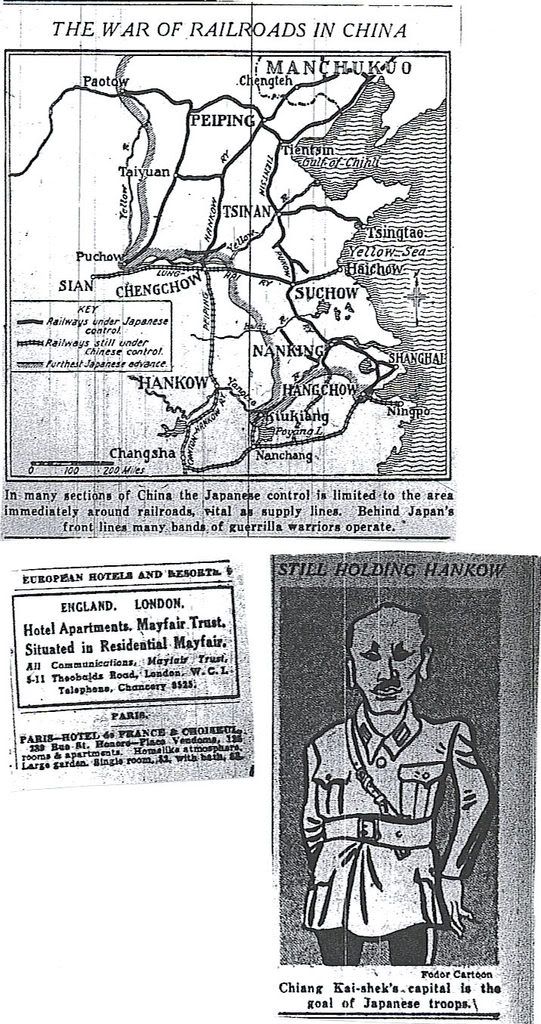
There are indications that the Japanese would be willing to be generous, that is, to be satisfied with a peace leaving them control of China’s North as a quid pro quo for the evacuation of Central China, if only some authoritative, widely recognized Chinese Government could be found willing to accept such a peace.
Such scheming, however, overlooks some basic facts in the political and military situation in China. In North China the former Red Army, now the Eighth Route Army of China, is on the offensive against the Japanese forces. No government formed at Hankow or anywhere else is likely, by a shameful peace, to allow them to claim the position of the only Chinese patriots willing and able to fight the Japanese invaders.
As Communists See It
The Communist strategists have foretold that the Sino-Japanese war will be divided into two distinct phases: First, a Japanese advance into the heart of China, and second a great Chinese counter-attack ending in the expulsion of the Japanese Empire from the Asiatic Continent.
According to these prophets, Japan’s offensive will gradually slow down, partly on account of increasing Chinese resistance, partly on account of the mounting difficulties to be faced by an army steadily moving farther away from its bases of supply.
Looking back on the present phase of fighting which began after the fall of Suchow, at the end of May, these strategists of China may well contend that Japan’s advance has already slowed down. The first Japanese offensive following the battle of Suchow was broken by the floods of the Yellow River. The Japanese were unable to reach the Peiping-Hankow Railway between Chengchow and Hankow, well protected as it was by the muddy flood waters.
Shift to Yangtze
Accordingly, another approach to Hankow had to be tried and the Japanese began their offensive up the Yangtze River. Their first objective, Kiukiang, important treaty port, was quickly reached because the Matang boom of the Yangtze, built to obstruct the access of the Japanese fleet, had been negligently constructed. But to the west of Kiukiang, the Chinese have built another boom at Wuhsueh and Matowchen, which they believe is stronger. The Japanese strategy now is evidently to avoid an attack by their fleet on this boom; instead they are trying to dislodge the Chinese defense forces north and south of the Yangtze, so as to deprive the boom of military protection.
Active support for their troop movements is lent by the steady bombing and machine-gunning of the Chinese rear by aircraft. Simultaneously, Japan’s air force continues to bomb the Canton-Hankow Railway, which recently seems to have been damaged seriously. Chinese assert, however, that their stock of armaments is ample and may last for many months, even if the break of the railway cannot be remedied.
In Southern Shansi
At the same time the Japanese have resumed their offensive in Southern Shansi. For more than half a year advances and setbacks have followed each other in this sector, where the Chinese regulars defending the Yellow River crossings do not seem to have given too good an account of themselves, but where Japanese railway communications are exposed to attacks by Chinese guerrillas. The ultimate aim of the Shansi offensive is to cross the Yellow River and cut the Lung-Hai Railway between Sien and Chengchow so as to stop the flow of military supplies from Russia.
The most striking feature of the latest Japanese offensives is their slowness. Chinese forces, while still giving way, are reinforced by a steady stream of new recruits and new formations and usually make their next stand close to the site of the last previous battle. This is especially true in the fighting around the Poyang Lake south of Kiukiang.
Besides, it seems that the military quality of the Japanese field army is not greatly improving, if it is not actually deteriorating. With new losses daily and with about half a million crack troops tied up in Manchuria, Japan has to dig deeper into her reservoir of trained manpower in order to carry on her war. Naturally, members of the trained reserve, called away from their civilian jobs and their families, do not make the very best soldiers abroad.
Counter-Attack Begun
By contrast, the Communist strategists of China might well point out how the Chinese counter-attack against the invaders has really begun in earnest. Japan’s control in the territory nominally occupied by her troops and ruled by her two puppet governments of North and Central China, seems lately to have grown weaker despite the continuous maintenance of Japanese garrisons. Chinese forces, backed by widespread popular support, now are operating perilously close to Shanghai, Peiping, Tientsin, Tainan, Nanking and Hangchow – that is, every one of the big cities occupied by the Japanese.
The plain of Northern Kiangsu, east of Suchow, is still under Chinese control, and the Japanese have been unable to secure control of the port of Haichow and the easternmost stretch of the Lung-Hai Railway. The Tientsin-Pukow Railway, connecting with that from Nanking to Shanghai, is still endangered by almost daily raids on the military trains which continue to monopolize the tracks. If, three months ago, the Japanese talked of resuming direct civilian traffic between Shanghai and Peiping, such talk has now been silenced.
What is still more significant, Chinese forces have actually invaded the territory of Manchukuo, Japan’s ally and satellite. In this they have been assisted by deserters from both the Manchukuoan and Mongolian forces, who have joined the Chinese Reds against their Japanese “protectors.” The newly built railway connecting Chengteh, in Jehol, with Peiping has been disrupted.
Big Guerrilla Forces
All over North China, in the back of the Japanese offensive, energetic warfare is being waged by China’s guerrilla forces against Japanese garrisons and against those Chinese who try to make terms with them. The total of such forces – exclusive of the Shansi formations of the Eighth Route Army – has been given as half a million men, with reinforcements pouring in from the famished Chinese countryside and with supplies being collected from Japanese supply trains and Japanese garrisons.
As the war ends its fourteenth month there are vast regions of China where resistance to Japan now is stronger than it was in the early stages. There is scarcely a sign of overstrain on the Chinese side. Even in the realm of finance, China’s currency lately has been firm, having risen about 6 per cent in its value.
The Japanese have scheduled the fall of Hankow for the end of September; Chiang Kai-shek has stated that the city can be defended at least until February,. Observers report that it is quite possible that Hankow will fall before the end of 1938. But there is little, if any, indication that the event will end the war. That may drag on for quite a few more years, if not for a full decade, as Japan’s Minister of War has prophesied.
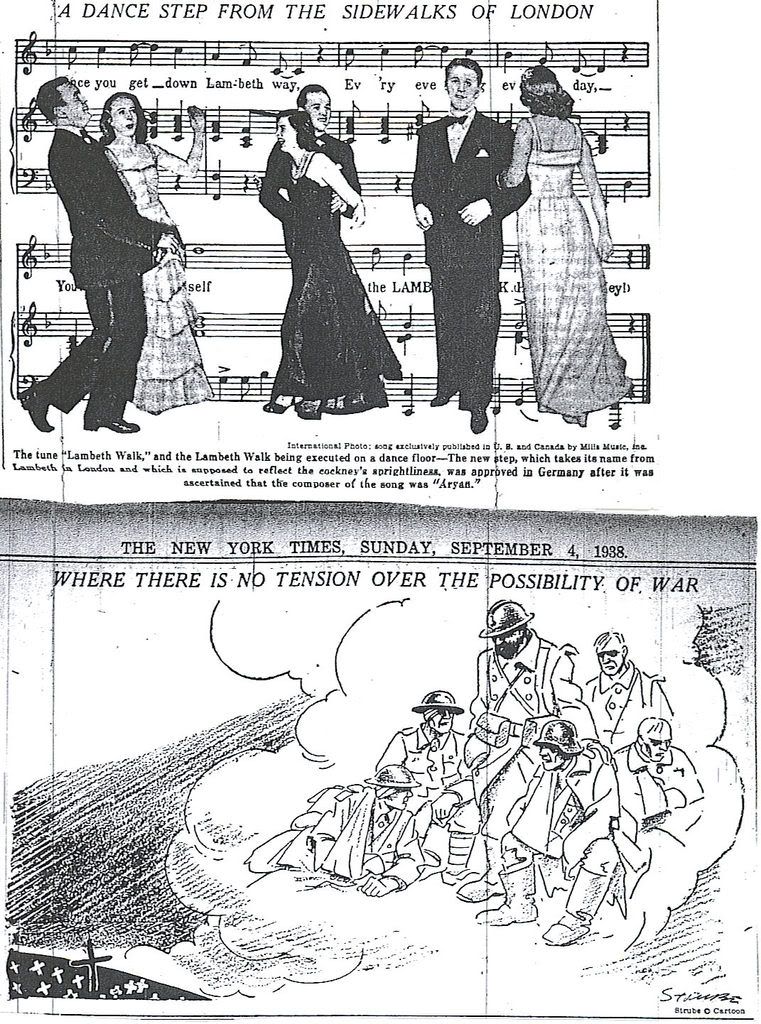
His comment was the culmination of rumors that the impending Partition Commission report would be unfavorable to Jews. Dr. Weizmann testified before the Partition Commission in London this week.
Stressing the unprecedented need of Jews for homes, the Jewish leader characterized the outcome of the recent Evian meeting of an inter-governmental committee initiated by President Roosevelt as “tragically inadequate.”
It is expected that the conference will try to formulate a plan involving mass immigration to Palestine that would require the aid of the inter-governmental committee.
Dr. Weizmann’s address was the highlight of the meeting opening the World Conference for Palestine, sponsored by the Palestine Foundation Fund and attended by 120 leading figures from more than a score of countries – including Germany and Italy - to consider the fate of Jewish Palestine.
Seek Support for Jews
The aim of the gathering is to review the political and economic situation in Palestine and to mobilize Jewish financial support in order to make possible large-scale immigration to Palestine.
Dr. Weizmann held out the hand of friendship to Arabs, saying Jews “refuse to identify the Arab people with the murderous attacks of terrorist bands.”
“In this grave hour,” he said, “we again extend to the Arab people a call to peace and cooperation in the development of the country for the benefit of all its inhabitants.”
He charged during his discussion of the Arab-Jewish problem that foreign forces were trying to make a little Spain out of little Palestine.
The address of the Jewish leader and the mood of the conference – the most representative Zionist assembly since the last world Zionist Congress in 1937 – were shadowed by the Italian Government’s decree this week expelling Jews entering Italy since 1919.
After pointing out that Jews did not accept any proposal offered by the Woodhead Commission – which was entrusted with the task of devising a scheme of Palestine partition – unless it gave opportunities for Jewish mass migration, Dr. Weizmann made a two-point demand on the British Government.
Demands More Protection
First, he said, must come restoration of the principle that Jewish immigration to Palestine be regulated by the country’s absorptive capacity, which now is suspended. Second, adequate protection by the government for Jews in Palestine, who, he said, should get an increased share in the maintenance of public security.
During his address Dr. Weizmann declared:
“Those nations of the world which still remain uninfected by the virus of anti-Semitism recently have striven to find a solution to a problem which is not their making. Britain, France, the United States and others present at Evian, have in the sacred name of humanity voluntarily assumed the burden imposed on them by others. But Evian is and must remain tragically inadequate.
“Our position today has become so acutely critical we must demand a permanent solution to our problem. That solution can be found only in Palestine – the national home of a homeless people.
“Despite disturbances which have ravished the country during the last two years, Palestine has absorbed some 35,000 Jewish immigrants, and event today, when immigration is curtailed by the government on political grounds, Palestine is absorbing more Jewish immigrants than any other country excepting the United States.
223 Palestine Settlements
“We do not know what the Partition Commission may propose or what may be the government’s ultimate decision, but we never would countenance any solution which would rob our scattered masses of the hope of large-scale immigration to Palestine.”
The report presented tonight by Arthur Hantke, director of the Palestine Foundation Fund, showed there are 223 settlements in Palestine today, compared to twenty-five in 1898 and fifty-five in 1914.
Since the fund was established in 1921 the sum of $32,387 275 has been raised for immigration, colonization, education and general development purposes.
Michael Traub, director of the fund in Germany, in a written report to the conference, disclosed that during the past five years German Jewry had supplied the fund with more than $2,000,000, although the Jewish population in the Reich declined from 520,000 in 1933 to 355,000 in July this year.
A tribute was paid tonight to Felix Warburg, American philanthropist and leading non-Zionist supporter of Palestine, who died recently.
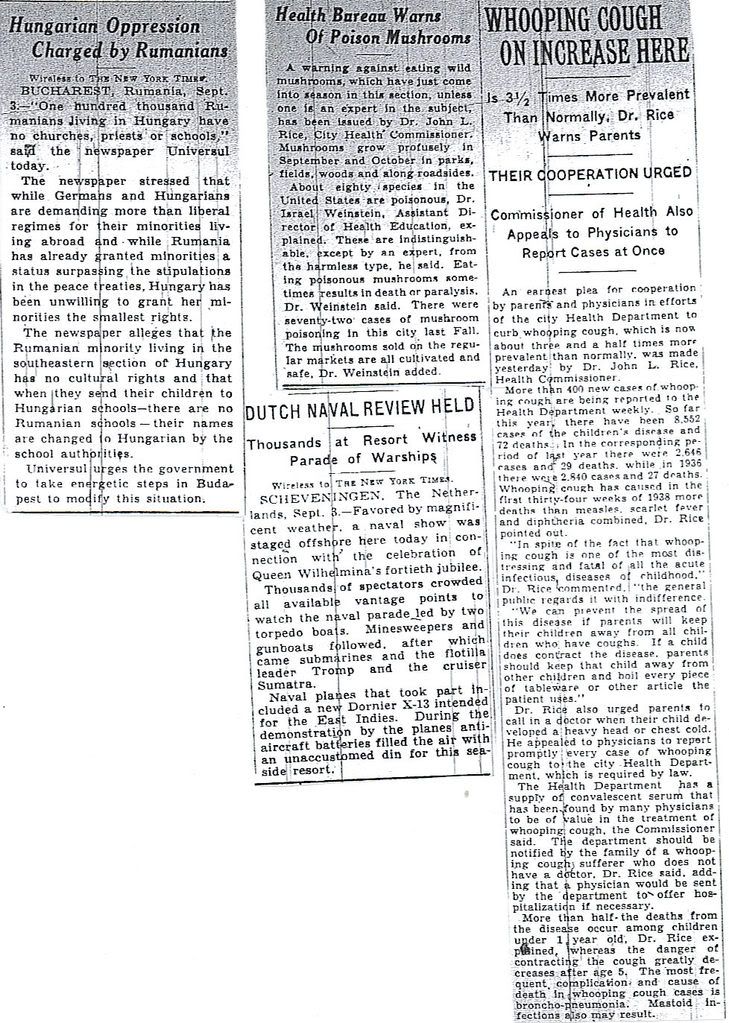
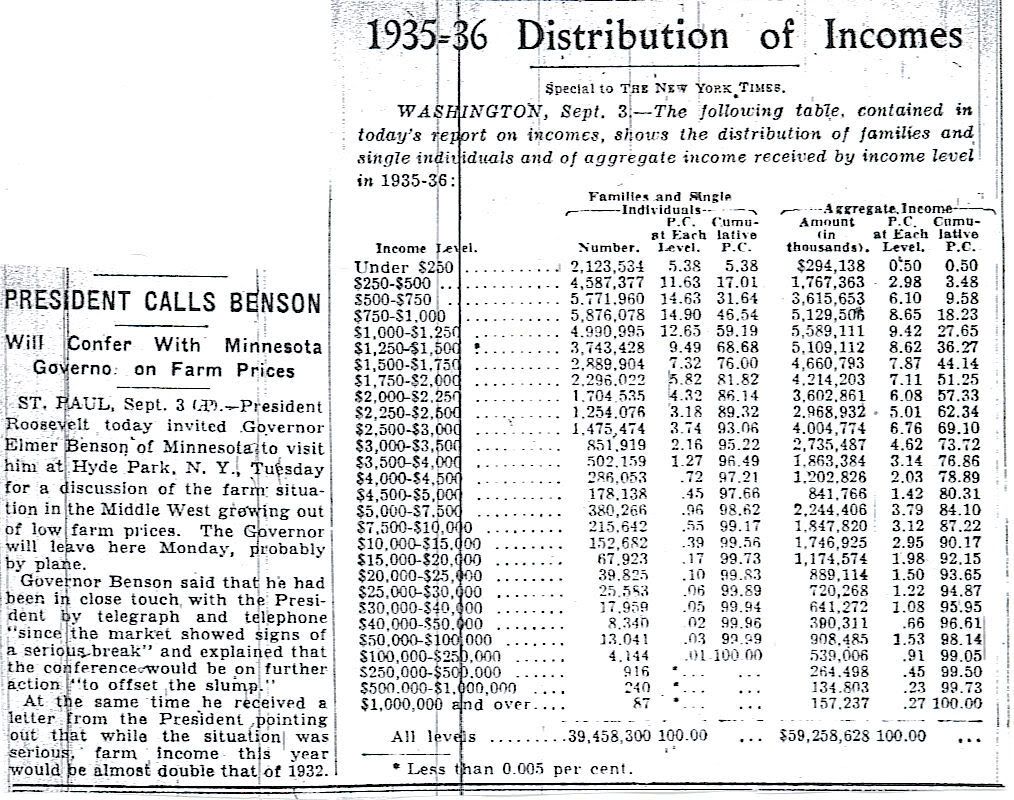
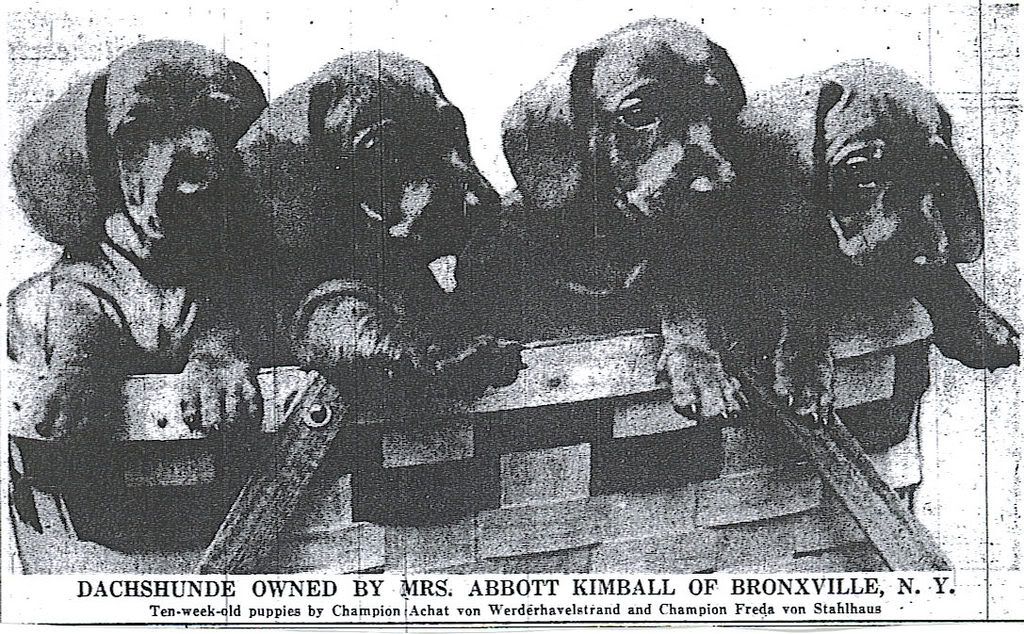
From the Sunday magizine, "News of the Week in Review"
Hitler Fails to Crack Morale of Opponents
'Crust' of Gunpowder Guards France
Mussolini Uneasy over Czech Crisis
World Watches Nazis' Rally
Japanese Drive Bogs Down in China
From page 15 of the front section
More Immigration is Zionist Demand
4 short articles and a chart
Finally, cute puppies!
The Eighth Route Army was controlled by the Communist Party of China, headed by Mao Tse-tung.
How hideously ironic.... The triumph of wishes over reality. Mr. Obama should take note.
Good catch. That is interesting info of which I was not aware.
Little did anyone reading these articles realize but Hitler had already set October 1 as the deadline for the invasion of Czechoslovakia, and he was not going to change it. He was a dictator whose iron will, once bent on this particular course, could not be swayed by any change of circumstances.
At the same time, it was all a colossal military bluff. His army was not ready to fight. The Czechs were actually superior in some aspects, although they were numerically inferior. It’s worth noting that after the fall of Czechoslovakia, Hitler was able to outfit several panzer divisions with Czech T-38 tanks. Those tanks saw action all the way to Stalingrad (although by that time they were obsolete, and had been pawned off to the Romanian armored division, where they went to their “death ride” in Operation Uranus).
Contrast Hitler’s iron will with the vacillation of the western powers. “Peace missions” from the British abound. French troops watch movies in their air conditioned concrete wall wide open at one one end. Cartoons featuring dead ghosts of all parties from World War I. Nope, no conflict up there in heaven! How foolish; they assumed Hitler wanted peace too. To quote Sir John Fisher, all nations want peace. They merely want a peace that suits them.
Nothing changes with mankind. Today, we have Achmedinijad’s iron will to develop nuclear weapons. We have Vladimir Putin’s iron will to reforge the Russian Empire and dominate western Europe through control of their energy resources. We have a weak and vacillating Barack Obama all set to appease them at every turn.
The result of this brew in 1938 was the costliest and most destructive war in the history of mankind. It began with cavalry charges and ended with the use of atom bombs. What fate awaits us at the beginning of the new century?
The result of this brew in 1938 was the costliest and most destructive war in the history of mankind. It began with cavalry charges and ended with the use of atom bombs. What fate awaits us at the beginning of the new century?
Well said. I am more optimistic now than I have been since Fred Thompson faded during the primaries. I believe John McCain understand the down side to kissing your enemy's posterior instead of kicking it.
And congratulations to meandog, member since 9/4/98. Ten years of standing up for America on-line.
First, excellent post, well said.
Now, on your point above, I tried to suggest the same thing in a previous post, because I'm sure I've read it somewhere, some-when, can't find it now...
But I was disputed, and didn't have facts to support my suggestion. If you know where that claim comes from, I'd be interested.
The reason is, it suggests that Chamberlain's grovelling at Munich in 1938 may not have been strictly militarily necessary.
I’d have to do some research for a complete answer. My main sources are William Shirer, “Rise and Fall of the Third Reich” and “Collapse of the Third Republic” and Ernest May “Strange Victory.”
Just off the top of my head:
1. The Czechs had built their mini-Maginot line in the mountains around Bohemia (the same areas the Germans were trying to take from them). The fortifications were considered formidable. When toured by German generals after the occupation, the Generals all breathed a sigh of relief they didn’t have to try to take them.
2. The Czech army was numerically inferior at only 40 divisions. However, they were well equipped and the Czechs had maintained a stable 40 division force (when mobilized) for several years. It was a well-trained cohesive army.
3. As stated before, the Czechs possessed first-rate armored fighting vehicles, equal in number and superior in quality to what the Germans had at the time.
4. The German Army was not that far removed from the 100,000 man limit of the treaty of Versailles. Although the army had expanded to about 120 divisions by late 1938, only about 40 divisions (same as the Czechs) were considered to be completely manned, equipped, trained and combat-ready. Most of the rest of the divisions were just “shells,” still receiving men, officers, and equipment. They were not trained for combat.
5. No construction on the “West Wall” had yet taken place; the Rhineland had only been re-militarized two years earlier, and there was nothing there to keep the French from walking into the Ruhr, Germany’s industrial heart.
So that’s pretty much it. Czechoslovakia alone could not have endured a protracted war with Germany, but they were certainly capable of holding off the Germans for several months, particularly through October. Once winter weather set in in November, campaigning would cease. However, the Germans would have had to concentrate their entire combat-ready army to attack the Czechs. It would have left them defenseless against the French. That assumes, however, that the French would not just sit in their air-conditioned forts and do nothing, which is what happened exactly one year later when Poland fell.
The results, however, have been quite contrary to any such expectations. Britain, instead of showing a spirit of avoidance, has shown firmness. She has not yet said she would fight for Czechoslovakia but her actions in the last week have carried very definite implications.
Every indicator is showing that the Germans are on the offensive and on a war footing but Britian's "firmness" only involves talks "without bluster or threats". Goering and Hitler knew full well that Chamberlain would fold and take no action. At the same time they stood by and watch Hitler fortify the Western fronteir. It's almost comical how the likes of Chamberlain and his ilk joyfully kept their head in the sand.
Somewhere in my basement I have copies of both Strategy and Tactics magazine and Command magazine with wargames that cover Case Green, the war plan for Czechoslovakia. With the 70th anniversary approaching, I’m going to have to dig those out.
http://www.boardgamegeek.com/images/game/6049
http://www.boardgamegeek.com/game/11482
You have some old SPI games and Strategy & Tactics Mags? Mine are in a box up in the attic. I have a complete set of Eastern Front board games; Battle for Moscow, Stalingrad, Kursk & Destruction of Army Group Center. Along with others.
Most of my S&T’s and Command magazines are from the 90’s. The only old SPI game I have is “The Next War” (WWIII in Germany). After the Berlin Wall fell I was scrounging up every Cold War game I could get my hands on.
I do have a lot of old Avalon Hill Games and some Victory Games games, plus a few GDW games.
I bought a lot of board wargames in the 90’s but most of the playing I did was historical miniatures (Napoleon’s Battles, Konig Kreig, Command Decision, Fire & Fury, & General Quarters). After my first son was born in 2001, my game playing has dropped dramatically.
The Maginot Line was actually a very well built defensive line.
It had two flaws.
1. The line ended at the border with Belgium which invited the Germans to go into Belgium.
2. The French, despite having a very good tank in the Char B, lacked the mobile doctrine to use them effectively.
The Germans on the other hand had mostly inferior tanks, but knew how to use them.
I have a cousin who had most of the Avalon Hill games. Being a short-atttention-span high schooler I never really got the concept of those games. He regularly trounced me at Midway, Guadalcanal and probably a couple others.
When I went to college in the 1970’s, my game playing dropped off. With the advent of personal computers, my game playing resumed. I really liked Panzer General II and now enjoy the Blitzkrieg series. I don’t like first person shooter games, I prefer the strategy games. Much more opportunity for destruction on a far greater scale.
On September 5, President Benes, realizing that a decisive step on his part was necessary to save the peace, convoked the Sudeten leaders Kundt and Sebekovsky to Hradschin Palace and told them to write out their full demands. Whatever they were he would accept them. "My God," exclaimed the deputy Sudeten leader, Karl Hermann Frank, the next day, "they have given us everything." But that was the last thing the Sudeten politicians and their bosses in Berlin wanted. On September 7 Henlein, on instructions from Germany, broke off all negotiations with the Czech government. A shabby excuse about alleged Czech police excesses at Moravska-Ostrava was given.
William L. Shirer, The Rise and Fall of the Third Reich, Pg. 383
The “police excesses at Moravska-Ostrava” (alt spelling Maehrisch-Ostrau) are extensively covered in tomorrow’s post.
It had two flaws.
1. The line ended at the border with Belgium which invited the Germans to go into Belgium.
2. The French, despite having a very good tank in the Char B, lacked the mobile doctrine to use them effectively."
Imho, a very important point.
The problem was not so much the Maginot Line itself, as it was the "Maginot Mindset" of "let's just sit here behind our fortifications and wait for the enemy to figure out a way to defeat us."
Thank you for pinging me.
Excellent thread.
Disclaimer: Opinions posted on Free Republic are those of the individual posters and do not necessarily represent the opinion of Free Republic or its management. All materials posted herein are protected by copyright law and the exemption for fair use of copyrighted works.